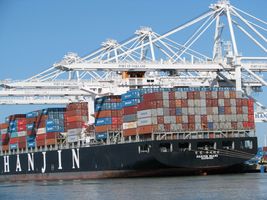![Container_ship [image : 80078024]](http://www.gannett-cdn.com/media/2016/02/09/USATODAY/USATODAY/635906325193382163-Weise-2012-02-19-2581.jpg)
SAN FRANCISCO — Amazon has received its Chinese shipping license, signaling the massive retailer is further along with its plans to become a transnational fulfillment and shipping company than previously realized.
Last month, it was revealed the Seattle-based company had gotten its license to act as a wholesaler for ocean container shipping from the U.S. Federal Maritime Commission on Nov. 13.
![Amazon could be moving into the $350B ocean freight market [oembed : 80074734] [oembed : 80074734] [oembed : 80074734] [oembed : 80074734] [oembed : 80074734] [oembed : 80074734] [oembed : 80074734] [oembed : 80074734] [oembed : 80074734] [oembed : 80074734]](/Portals/_default/Skins/PrestoLegacy/CommonCss/images/smartembed.png)
At the time, analysts cautioned Amazon couldn’t begin acting as a middle man for ocean freight until it had a similar license from China.
Now it appears Amazon was granted that license five months ago.
The Chinese Ministry of Commerce granted the license on Sept. 17, said Steve Ferreira, CEO of Ocean Audit, a global ocean freight auditing and consulting firm based in Hartford, Conn.
CEO of Ocean Audit, a global ocean freight auditing and consulting firm based in Hartford, Conn.
The license was given under the name Beijing Century Joyo Courier Service Company Limited, one of the trade names for Amazon China and Amazon Global Logistics China, according to documents posted on the Ministry of Commerce' website.
Having licenses on both ends means Amazon can now buy space on shipping containers at wholesale rates and resell it at retail rates. A spokesperson for Amazon would not comment for this report.
DRAGON BOAT
This fits with news reported by Bloomberg News on Tuesday that Amazon was planning a possible global expansion of its Fulfillment by Amazon service, which does storage, packing and shipping for small, independent merchants who sell products on Amazon's website.
The project was dubbed "Dragon Boat," Bloomberg reported, citing 2013 documents.
Dragon boats are small, traditional Chinese paddled boats with decorative dragons on their prows. Races involving dragon boats powered by teams of rowers have been held in China for centuries and have become popular in the West in the past 20 years.
“It sounds to me like they’re going to make it dramatically easier for merchants in China to reach customers in the United Sates. Even the name ‘Dragon Boat’ is clearly targeted at Chinese merchants,” said Ryan Petersen, CEO of Flexport, a San Francisco-based freight forwarder for consumer product makers.
The move appears to be about connecting “two giant markets to each other, the Chinese producers and the American consumers,” while cutting out American resellers, said Petersen.
About 40% of Amazon’s current revenue comes from small businesses that buy products from China, manage the complexity of the shipping and import process and then sell those products to U.S. customers using Fulfillment by Amazon, Petersen said.
Amazon can get a double cost savings if it can cut out those middle men and streamline logistics enough that more Chinese sellers use it as their retail platform, he said.
In the company’s most recent 10-K annual report filing with the Securities and Exchange Commission, Amazon for the first time included itself as a transportation service provider.
Listed under cost of sales was the phrase “inbound and outbound shipping costs, including where we are the transportation service provider,” Ferreira noted.
All signs point to Amazon getting ready to embark upon global transportation, known as 'multimodal' in the industry. In the past few months, reports have surfaced about the company moving into air freight, trucking and now ocean shipping, he said.
![Amazon takes steps to own more of the holiday delivery crush [oembed : 80077510] [oembed : 80077510] [oembed : 80077510] [oembed : 80077510] [oembed : 80077510] [oembed : 80077510] [oembed : 80077510] [oembed : 80077510] [oembed : 80077510] [oembed : 80077510]](/Portals/_default/Skins/PrestoLegacy/CommonCss/images/smartembed.png)


